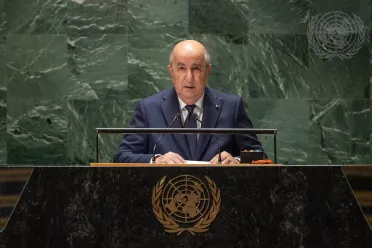Statement
Statement summary
ABDELMADJID TEBBOUNE, President of Algeria, said that for the past 50 years, his Government has pointed out how the global order’s dysfunction prevents equality among Member States. Conflicts and crisis have reached unprecedented levels and millions of people have been displaced amid an increasing number of emergencies worldwide. The Security Council’s weakened role over the past several years is evident. “We must all reflect on the need to uphold the rules of the Charter and establish a sound framework to strengthen international cooperation,” he said, adding: “We must achieve the Global Goals in a multi-polar world.” As it prepares to become a non-permanent Council member, Algeria stands ready to strengthen cooperation with all Council members and use its experience in mediation to seek peaceful solutions to conflicts. It will bring the aspirations of the African continent and Arab world to the Council as it focuses on lasting solutions to conflicts by dealing with their root causes, he asserted.
Reforming the Organization’s major organs to expand their transparency is crucial, as is revitalization of the General Assembly — the only organ that truly reflects the international community’s diversity. “It is a key element of strengthening democracy among States,” he said. Progress on Council reform is also essential. Algeria will continue its efforts to change the historic injustices against the African continent and support oppressed persons fighting for their freedom. Pointing to his Government’s long-standing support for the Palestinian people’s right to establish an independent State, he called on the Council to adopt a resolution to guarantee the two-State solution and end the unilateral practices of the occupying authority, including the settlements on Palestinian territory. He called for an extraordinary Assembly session to grant the State of Palestine the status of a full United Nations Member State.
Algeria is closely following events in neighbouring nations to find peaceful solutions, he said. He supported the United Nations’ efforts to find a Libyan-led political solution to the crisis in that country. On Mali, he said Algeria is playing a leading role in efforts to overcome obstacles to peace and stressed that force must be avoided. He urged a return to the constitutional order in Niger through peaceful means and respect for the rule of law, warning: “Foreign military intervention could have dangerous repercussions for the region as a whole.” He asked all parties to the conflict in Sudan to resolve their differences as the conflict casts a shadow on the entire region and the Sahel.
Algeria stands ready to share its experience in combating terrorism, which must be a priority for the entire African region, he said. Eight years after the adoption of the Sustainable Development Goals, he noted that many States still face challenges requiring more solidarity from the international community and more viable economic models. Algeria has made sustainable development a priority and achieved progress in many areas, including education, health care, electricity and water, including a significant desalinization programme. Turning to human rights, he said his Government continues to work with the Human Rights Council and in November 2022 presented its fourth universal periodic review report. Creating equality for all people, including women and youth, is pertinent; and making women and youth a driving force in a sustainable Government will help achieve equality for all, he stressed.
Full statement
Read the full statement, in PDF format.
Photo

Previous sessions
Access the statements from previous sessions.
